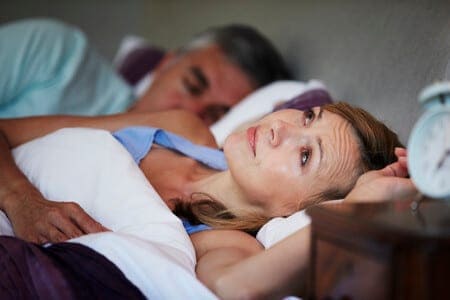More than half of all women experience this sexual problem during and after menopause… and yet, almost nobody talks about it.
Hot flashes, night sweats, irregular periods, loss of libido…
When it comes to menopause, every woman experiences these symptoms differently.
But as your body starts to decrease its production of estrogen, there’s one symptom that can have a detrimental effect on your sex life…
Vaginal dryness.
Also known as the “silent epidemic” of menopause, vaginal dryness is the MOST common problem faced by women over the age of 50.
In fact, one study found that 85 percent of menopausal women suffer from vaginal dryness symptoms.

You see, when you go through menopause, your ovaries stop making estrogen — and this can cause your vagina to become dry and less “stretchy.”
This can lead to a number of sexual issues, including:
vaginal tightness, itching and irritation, pain and discomfort during intercourse, diminished sex drive, problems with arousal, painful inflammation, soreness and burning, urinary tract infections, tearing and bleeding of vaginal tissue…
…and it can make even gentle friction feel like excruciating pain.
Not to mention all of the psychological damage it can cause — including depression, grief, relationship conflicts, and marital distress.
It’s an issue that can affect your overall quality of life… and it can cause many women to stop having sex altogether.
See for yourself…
In February 2014, the journal Menopause published a study on this issue.
Researchers examined the effect of vaginal dryness in menopausal women…
And they found that painful sex related to vaginal dryness negatively affected both men AND women.

In fact, most of the participants reported that painful sex was the number one reason for decreased sex drive and avoiding sex.
“We know that sexuality and intimacy are highly correlated,” says Sheryl A. Kingsberg, PhD, chief of the division of behavioral medicine at University Hospitals Case Medical Center MacDonald Women’s Hospital in Cleveland, Ohio and professor in the departments of reproductive biology and psychiatry.
“When sex is dysfunctional in a relationship,” Kingsberg adds, “it plays a powerful role in interfering with emotional intimacy and often creates resentment, avoidance, and relationship conflict.”
But here’s the good news…
Just because your body is changing doesn’t mean you can’t have great sex.
There is a way to stop these damaging effects and make sex feel amazing again…
And if you are experiencing mild to moderate vaginal dryness, personal lubricant is the place to start.
You see, choosing the right lubricant is essential to relieving pain during intercourse — and enhancing sexual pleasure for both you and your partner.

Personal lubricants are similar to natural lubrication, making genitals moist and reducing friction….
Making intercourse more pleasurable and much more exciting.
And this is something you can try for yourself tonight — with a partner, or on your own…
It all starts with finding out what kind of lubricant works best for you.
But here’s the thing…
Many personal lubricants sold on drugstore shelves contain a long list of harmful ingredients, ranging from preservatives to antibacterial agents to sugar alcohols.
These ingredients can disrupt your body’s natural pH levels and lead to an increase in harmful yeast in the vagina.
Luckily, there are a few steps you can take when choosing the right lube — and it starts with choosing safe ingredients that are not harmful to your vaginal health.
Here are some important guidelines to keep in mind…
CHOOSE lubricants that are:
- Glycerin-free to avoid irritation
- Paraben-free to keep pH levels balanced
- Water-based or silicone-based
AVOID lubricants that:
- Contain glycerin, a form of sugar that encourages yeast to grow
- Contain synthetic chemicals or hormones
- Are oil-based, which can lead to irritation or infection
Think of it this way…
Vaginal dryness could be what stands between you and the best sex of your life.
So if you could change that… wouldn’t you want to?
Sources:
http://www.everydayhealth.com/news/10-essential-facts-about-menopause/
https://www.ncbi.nlm.nih.gov/pubmed/23736862
https://www.menopause.org/for-women/sexual-health-menopause-online/frequently-asked-questions
http://www.everydayhealth.com/hs/menopause-resource-center/maintaining-your-sex-drive/
https://www.womentowomen.com/menopause-perimenopause/perimenopause/
http://www.prevention.com/sex/sex-after-menopause
https://www.ncbi.nlm.nih.gov/pubmed/26061291
http://www.healthywomen.org/content/article/when-sex-hurts
http://www.nhs.uk/Conditions/dry-vagina/Pages/Introduction.aspx
https://www.ncbi.nlm.nih.gov/pmc/articles/PMC2806500/
Brittany Artwohl has been professionally writing health, fitness and wellness-related copy since 2009. Her work has appeared in publications including NaturalNews.com, and MountainWeeklyNews.com. Brittany holds a bachelors degree in Advertising and English from Northern Arizona University and has been a certified fitness instructor since 1997.


![How To: ‘Fix’ Crepey Skin [Watch]](https://cdn.vitalupdates.com/wp-content/uploads/2017/05/bhmdad.png)












